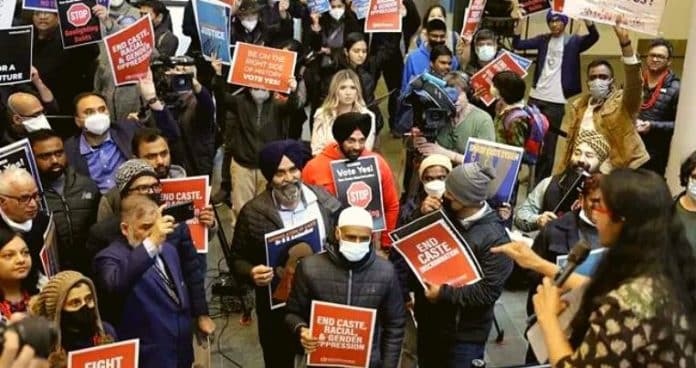Seattle has become the first city in the US to outlaw caste discrimination after a council vote. The move comes in response to the growing calls from South Asian diaspora communities living in the US. However, the ordinance has also divided opinions among Hindu groups, who have a resilient social stratification system.
Opponents of the decree argue that it is unnecessary as the US already has anti-discrimination laws. They also claim that such legislation could further marginalize an already marginalized community in the US. On the other hand, proponents argue that victims of discrimination based on caste would not be protected without these laws.
Who Faces Caste Discrimination in Indian Society?
Caste is a social hierarchical system based on one’s occupation and birth, and it has been practiced throughout South Asia among people of all religions for at least 3,000 years. According to reports, the lives of more than 1.9 billion people in the world, and nearly 6 million South Asian Americans are directly affected by caste discrimination.
Diaspora communities determine upper and lower caste members and decide who receives privileges and who gets repressed. Traditional Hindu society has four main castes: Brahmins, Kshatriyas, Vaishyas, and Shudras. At the lowest level, there is the Dalit community, often referred to as “outcastes.” Those who consider themselves “upper-class” call Dalits “Achoot” (untouchable, pariah) because most of them are associated with cleaning work (streets, public toilets, etc.).
Hindu Nationalists Oppose the Law
Unfortunately, some Hindu nationalists have responded cynically to the law that protects minorities from prevalent abuse. A nationalist NGO, the Hindu American Foundation (HAF), argued that the measure “singles out a community on the basis of their origin for disparate treatment.” They added that Indian-Americans were less than 2% of the entire Washington population and claimed that there was “little evidence” of caste discrimination among them.
Meanwhile, some politicians of India’s ruling nationalist party also share the same view. Here is Bhartiya Janata Party (BJP)’s Kapil Mishra echoing the same narrative.
Reports Reveal a Different Story
Mishra’s words may not make any sense to those who are aware of the facts related to caste-based prejudice in some Hindu nationalists. According to a 2018 survey by a South Asian human rights organization, Equality Labs, about two-thirds of Dalits in the US reported experiencing caste-based discrimination at workplace and schools. They face bullying, harassment, casteist slurs, demotion, and termination. From blue-collar to white-collar jobs, dominant cast members make them the subject of systemic discrimination. Casteism also leads to gender-based violence where Dalit women are the most vulnerable to domestic, workplace, and sexual abuse.
In the last 3 years, many educational institutions in the US have prohibited caste discrimination following reports by South Asian immigrants from countries like India, Pakistan, Bangladesh, Sri Lanka, Nepal, and Myanmar who have reported abuse based on caste.
In 2020, a Dalit engineer filed a lawsuit against Cisco Systems, alleging that he was harassed and discriminated against because of his caste. The lawsuit claimed that his Indian supervisors and colleagues from dominant castes made derogatory comments about his status and denied him opportunities for advancement. In 2021, a Dalit activist in California was attacked and beaten by a group of “upper-caste” men because of his activism. Another report in 2021 alleged that several Hindu temples in the US practice caste-based discrimination, including denying Dalits access to certain parts of the temple or forbidding them from participating in certain rituals.
Seattle’s anti-discrimination policy is a long-awaited success for Dalit movements. More than 150 organizations and thousands of individuals in Seattle supported the movement. Kshama Sawant, the only Indian American on the Seattle City Council, said that it was just the beginning, and there is still an entire country left to educate about this particular issue.


